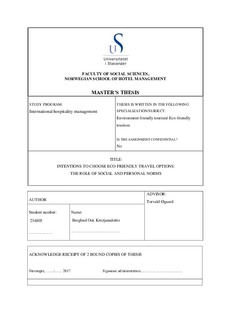| dc.contributor.author | Kristjansdottir, Berglind Osk | |
| dc.date.accessioned | 2017-10-11T13:48:15Z | |
| dc.date.available | 2017-10-11T13:48:15Z | |
| dc.date.issued | 2017-06-15 | |
| dc.identifier.uri | http://hdl.handle.net/11250/2459752 | |
| dc.description | Master's thesis in International Hospitality Management | nb_NO |
| dc.description.abstract | It is important to change current travel patterns in order to move towards a more sustainable future of tourism. To that aim, this study replicates and extends a study by Doran and Larsen, which examined the relative importance of social and personal norms in explaining intentions to choose eco-friendly travel options. The current study reports findings from a similar questionnaire on the role of social and personal norms in explaining the intentions to choose eco-friendly travel options. In addition, it extends the research in order to develop a further understanding of which reference groups have the strongest normative social influence on travel choices.
Using convenience sampling, data were collected from tourists (N = 319) visiting Iceland. The overall findings supported prior research that social and personal norms seem both to be related to travel choices. Personal norms did make the strongest contribution to explaining behavioral intensions and further mediated the effects of injunctive social norms on those intensions, therefore, emphasizing the key role of personal norms.
Three reference groups were tested to find out which one had the most normative influence on eco-friendly travel choices: “other tourists at localized destination”, “other tourists visiting this country” and “other tourists worldwide”. Previous findings indicate that normative information about a close referent would be the most influential, however, the results did not support this statement. Hence, a comprehensive understanding of which reference groups have the strongest normative social influence on travel choices is still needed.
The findings in this study imply that by including normative information is a promising way to encourage people to choose eco-friendly travel options, both in informational campaigns and for tourism managers and leaders. | nb_NO |
| dc.language.iso | eng | nb_NO |
| dc.publisher | University of Stavanger, Norway | nb_NO |
| dc.relation.ispartofseries | Masteroppgave/UIS-SV-NHS/2017; | |
| dc.rights | Navngivelse 4.0 Internasjonal | * |
| dc.rights.uri | http://creativecommons.org/licenses/by/4.0/deed.no | * |
| dc.subject | reiselivsadministrasjon | nb_NO |
| dc.subject | tourism | nb_NO |
| dc.subject | social norms | nb_NO |
| dc.subject | injunctive norms | nb_NO |
| dc.subject | descriptive norms | nb_NO |
| dc.subject | personal norms | nb_NO |
| dc.subject | behavioral intentions | nb_NO |
| dc.subject | eco-friendly travel options | nb_NO |
| dc.subject | environmentally friendly | nb_NO |
| dc.subject | økoturisme | |
| dc.title | Intentions to choose eco-friendly travel options: The role of social and personal norms | nb_NO |
| dc.type | Master thesis | nb_NO |
| dc.subject.nsi | VDP::Samfunnsvitenskap: 200::Økonomi: 210::Bedriftsøkonomi: 213 | nb_NO |

